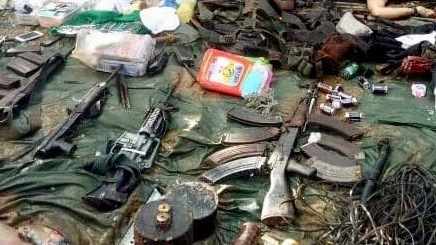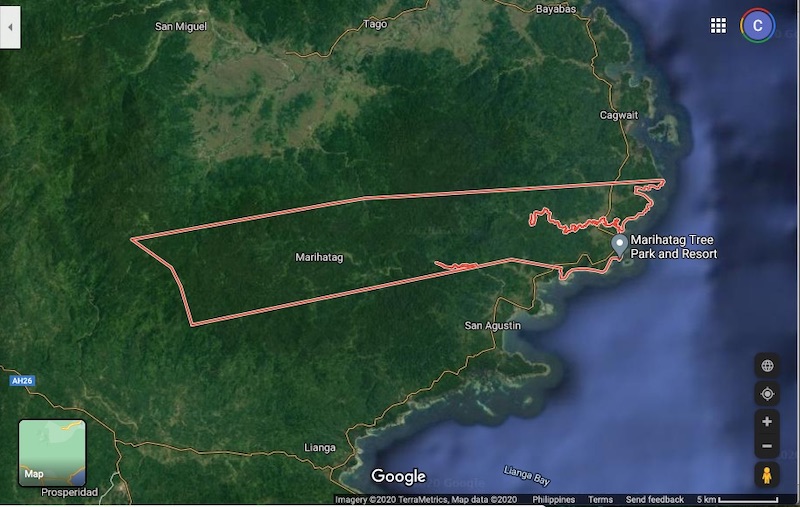From MindaNews (Nov 28, 2020): Galvez: Duterte for extension of Bangsamoro transition; Hataman proposes review and roadmap (By CAROLYN O. ARGUILLAS)
DAVAO CITY (MindaNews / 28 November) — President Rodrigo Duterte is asking Congress to extend the transition period of the Bangsamoro Autonomous Region in Muslim Mindanao (BARMM) from three years to “up to five to six years” or until 2024 or 2025, “to enable the Bangsamoro Transition Authority (BTA) to fulfill its mandate in a most reasonable time,” Presidential Peace Adviser Carlito Galvez said on Thursday.
“The President believes that three years is too short and he agrees for the possible extension of the BTA up to five to six years,” Galvez told the House Committee on Peace, Reconciliation, and Unity during his briefing on the status of the implementation of the Comprehensive Agreement on the Bangsamoro (CAB), the peace agreement signed by the Philippine government and the Moro Islamic Liberation Front (MILF) in March 2014.
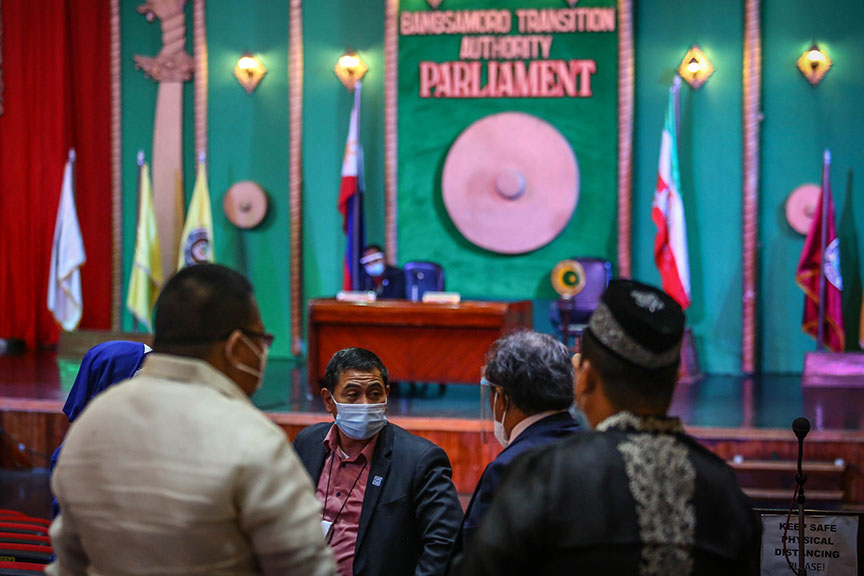
Members of the Bangsamoro Transition Authority deliberate on the proposed Bangsamoro Administrative Code during special session at the Shariff Kabunsuan Cultural Complex in Cotabato City on 28 October 2020 The code was passed that day, the first among five priority legislations mandated by the Bangsamoro law. MindaNews photo by FERDINANDH CABRERA
The three-year transition period is supposed to end on June 30, 2022 as mandated by Republic Act 11054, the enabling law of the peace pact. The law provides that the first election of the members of the Bangsamoro Parliament will be held in May 2022, synchronized with the Presidential and local polls.
On November 17, the interim Bangsamoro Parliament passed Resolution 93, urging the House of Representatives and the Senate to extend the transition period to June 30, 2025 to give the transition government “sufficient time to continue in performing its powers and functions and fulfill its mandate.”
Last Monday, November 23, President Duterte and six of his Cabinet members met with the BARMM’s interim Chief Minister, Ahod Balawag Ebrahim and his delegation at the Matina Enclaves in Davao City, to discuss the calls for extension.
In that meeting, MindaNews sources from both the national and Bangsamoro governments, said Duterte acknowledged the need for extension of the transition period, repeatedly stressing the need to address historical injustices. Galvez was among the Cabinet members present along with the Executive Secretary, and the Secretaries of Finance, Local Governments, Justice and Budget and Management.
Extension of the transition period means postponing the first Bangsamoro election supposedly scheduled on May 9, 2022.
Extension, however, requires legislation and with only 11 months to the filing of certificates of candidacy for the May 2022 polls, a Secretary proposed that this be attended to immediately.
Galvez told the House Committee that they are aware of the difficulties of the BARMM government in laying the ground for the foundation of the regional government.
“The crafting of the crucial codes (has) been affected due to COVID-19 pandemic, hence we seek the support from our friends in Congress to enable the BTA to fulfill its mandate in a most reasonable time,” he said.
Parliamentary system
Under RA 1054, the Bangsamoro Transition Authority (BTA), the 80-member body tasked to run the government during the transition period, is supposed to enact these priority Bangsamoro codes: Administrative, Revenue, Electoral, Local Government and Education.
Thus far, only the Administrative Code has been passed. Other laws that the BTA is supposed to pass are the Bangsamoro Civil Service, and a law to recognize, protect, promote and preserve the rights of Indigenous Peoples in the Bangsamoro region.
The BTA is also tasked to determine the parliamentary districts for the first regular election,
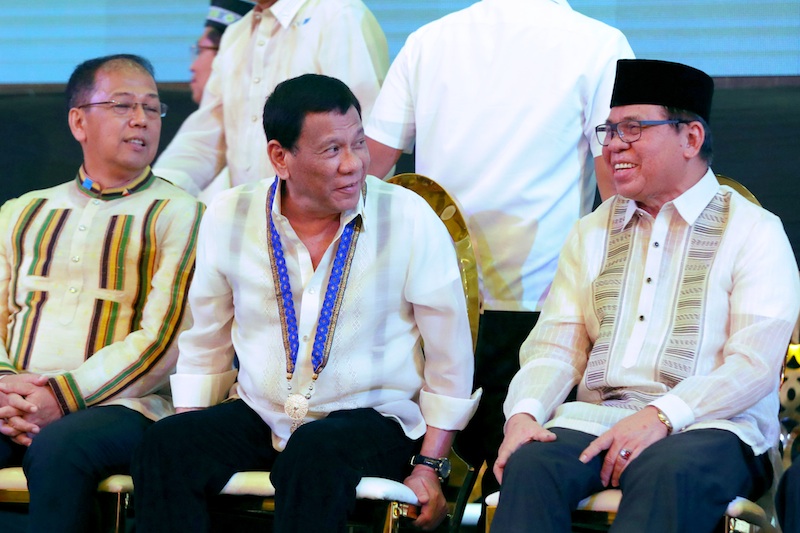
President Rodrigo Roa Duterte shares a light moment with Bangsamoro Autonomous Region in Muslim Mindanao (BARMM) Interim Chief Ministter Al Haj Murad Ebrahim on the sidelines of the inauguration of BARMM at the Shariff Kabunsuan Cultural Complex in Cotabato City on March 29, 2019. Also in the photo is Presidential Adviser on the Peace Process Carlito Galvez Jr. KARL NORMAN ALONZO/PRESIDENTIAL PHOTO
As a parliamentary system of government, voters in the Bangssamoro region are supposed to elect 80 Members of Parliament: 40 party representatives, 32 district representatives and eight for reserved seats. Its system of election is supposed to be governed under the Bangsamoro Electoral Code which is still being drafted at the Cabinet committee level.
Galvez assured the Duterte administration “remains steadfast in its commitment to fully implement the provisions of the peace agreement with the MILF,” anchored on their “collective vision of achieving sustainable and enduring peace in Mindanao.”
He appealed to the “senses of those opposing the extension,” explaining that wdue to COVID-19, “the normalization program was stalled for more than two years.”
“If we want the transition to be successful, we need to give our Bangsamoro brothers and sisters ample time to lay the foundation. And realistically, we cannot achieve this in three years,” Galvez said.
Extending the transition period means postponing the first election of Bangsamoro officials
Review and roadmap
Basilan Rep. Mujiv Hataman said a midterm review of what has been done and not done during the first half of the transition period is needed as he also asked extension proponents to “present, in clear and attainable sets of goals, a roadmap of what they intend to accomplish if the transitory government is extended for another three years until 2025.”
“A blind extension would be counterproductive,” Hataman, also a House Deputy Speaker, said in a statement on Friday, adding that without a midterm review to give them “the real picture, how can OPAPP (Office of the Presidential Adviser on the Peace Process) blindly suggest to extend the transition period for another three years? What is its basis? And why three years, and not two or five?”
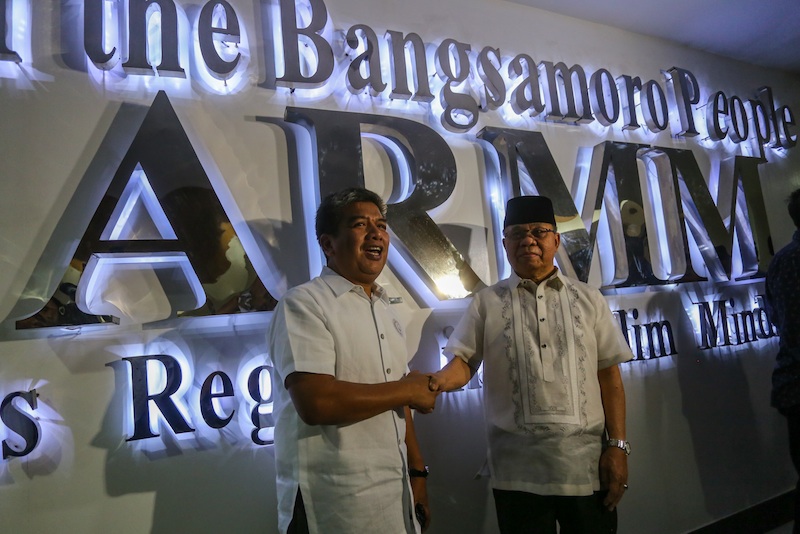
Mujiv Hataman, the last governor of the Autonomous Region in Muslim Mindanao (L) welcomes Interim Chief Minister Al Haj Murad Ebrahim of the Bangsamoro Transition Authority at the Office of the Bangsamoro People after the turnover rites at the Shariff Kabunsuan Cultural Center in Cotabato City on February 26, 2019. MindaNews photo by MANMAN DEJETO
The Mindanao Peoples Caucus, a peace advocacy group that has been accompanying the Bangsamoro peace process since 2002, last month presented the results of its midterm review of the Bangsamoro transition, where extension of the transition period was among the recommendations of those who participated in focus group discussions and key informant interviews.
Hataman said he wants to see what the proponents plan to do during the extension, “like what are the specific objectives for next year and the year after that, or what they intend to accomplish in terms of legislative and executive actions.”
“We cannot simply extend the period without studying it. Did the pandemic interfere with the BARMM transition’s timelines? That is a valid reason. But we need to sit down and discuss it exhaustively,” said Hataman, who served as Governor of the Autonomous Region in Muslim Mindanao (ARMM) from December 2011 to February 2019 (December 2011 to June 30, 2013 as OIC, and twice elected from June 30, 2013 until the ratification of the Bangsamoro law – RA 11054 – abolished the ARMM in February 2019.
Hataman said he will file a resolution in the House of Representatives asking the appropriate committee to conduct a midterm review, in aid of legislation, of the Bangsamoro transition. He told MindaNews on Saturday that he will file the resolution “next week.”
“Giving us a roadmap of the three-year extension will help us understand the urgency or the need to extend the BARMM transition period. This should include timelines for short- and long-term projects and programs,” he said.
“Kaya gusto ko uli imungkahi sa Pangulo na magkaroon muna ng rebyu ang BARMM bago natin i-extend ang transition period (That’s why I want to suggest again to the President to have a review of the BARMM before we extend the transition period). It is the only way we can assess what needs to be done and what we can do further,” he said.
“Our goal is peace”
“Dapat di mahati ang Bangsamoro sa extension and election postponement. Our goal is peace,” he told MindaNews on November 20, when he proposed in a press statement for the President to create a joint committee composed of and representing all sectors and stakeholders in the BARMM, to conduct a “quick but comprehensive midterm review of the region’s milestones and millstones during its transition period.”
“We are for peace, and we are supportive of any mechanism or recommendation from an objective panel, be it an extension or not. And to convince the people and LGUs of BARMM, especially those who are opposed to the proposed extension, it would be better to conduct a midterm review by all stakeholders and, from there, make recommendations.”
The peace agreement actually provides for a third party monitoring team (TPMT) composed of representatives from international bodies and domestic groups “to monitor the implementation of all agreements.”
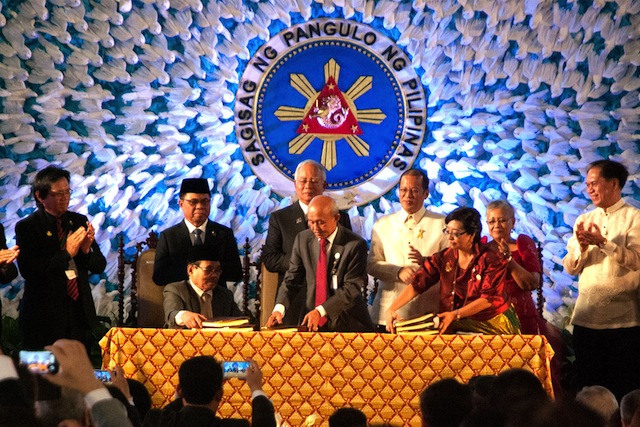
Siging of the Comprehensive Agreement on the Bangsamoro on March 27, 2014 in the gardens of Malacanang. Photo courtesy of Julius Mariveles / Philippine Center for Investigative Journalism
The five-member TPMT, two of them nominated by the government, two by the MILF and a jointly nominated chair, is expected to release its sixth public report next month. Its fifth public report, released on April 23, 2019, covered the period July 2107 to February 2019. The BARMM was inaugurated on March 29, 2019.
The chair then, Ambassador Alistair MacDonald, former head of delegation of the European Union to the Philippines, passed away on April 26 last year. The government and MILF announced Macdonald’s successor a few days ago: Heino Marius, a German national who joined the European Commission in 1993 and served in various EU delegations and offices.
The BARMM is presently run by the 80-member BTA, appointed by President Duterte, 41 of them nominated by the MILF and 39 by the government.
Normalization
Galvez told the House committee chaired by Maguindanao Rep. Esmael Mangudadatu that “much progress” has been achieved to “forward the Bangsamoro peace process under the Duterte administration.”
“We will make sure the implementation of the CAB is on track .. We would like to stress that this entire process entails both effort and resources to ensure that the peace agreement is being carried-out in a holistic manner.”
Galvez explained that under the normalization track of the Bangsamoro transition – which involves decommissioning 40,000 combatants of the MILF’s armed wing, the Bangsamoro Islamic Armed Forces, and weapons, “a former MILF combatant is not merely decommissioned. The government will carry out a whole gamut of interventions — from psychological to socio-economic — for him or her to be fully transformed into a peaceful and productive member of our society.”
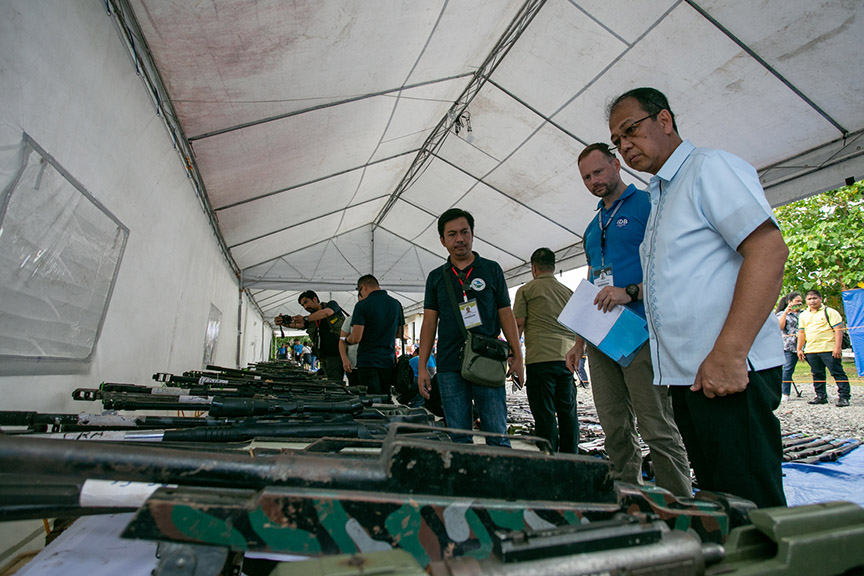
Secretary Carlito Galvez Jr. (right), Philippine Presidential Adviser on Peace, Reconcialiation and Unity inspects weapons from the Moro Islamic Liberation Front (MILF) that were decommissioned during the launch of the second phase of the decommissioning process of MILF weapons and combatants in Simuay, Sultan Kudarat on 7 September 2019. MindaNews photo by MANMAN DEJETO
But his office, he said, “acknowledges the reality that the current health crisis has affected some of its activities on the ground. The movement of the peace workers as well as international peace partners have been restricted. Moreover, funds have been reduced since some of the resources were utilized for emergency purposes.”
“Despite these challenges, the government and the MILF remain accountable to the Bangsamoro people and are therefore duty-bound to deliver on the obligations under the peace agreement,” Galvez said.
From September last year to March this year, a total of 12, 000 combatants have been decommissioned under the Duterte administration but out of the promised one million peso package for each, only 100,000 each had been given. Some 28,000 combatants are still awaiting decommissioning.
Various groups and local government units have expressed support for or are opposing moves to extend the transition period. The provincial boards of Maguindanao and Tawi-tawi passed resolutions in 2019 and 2020 asking for extension of the transition period. Lanao del Sur was initially reported to have opposed the extension but Member of Parliament Zia Alonto Adiong told MindaNews there is “no resolution opposing extension, and there will never be.”
Sulu, which voted against inclusion in the BARMM in the January 2019 plebiscite, but is still part of the BARMM, is opposing an extension.
BARMM comprises the mainland provinces of Maguindanao and Lanao del Sur, the island provinces of Basilan, Sulu and Tawi-tawi, the cities of Marawi, Lamitan and Cotabato, and 63 villages in North Cotabato. (Carolyn O. Arguillas / MindaNews)
https://www.mindanews.com/peace-process/2020/11/galvez-duterte-for-extension-of-bangsamoro-transition-hataman-proposes-review-and-roadmap/









